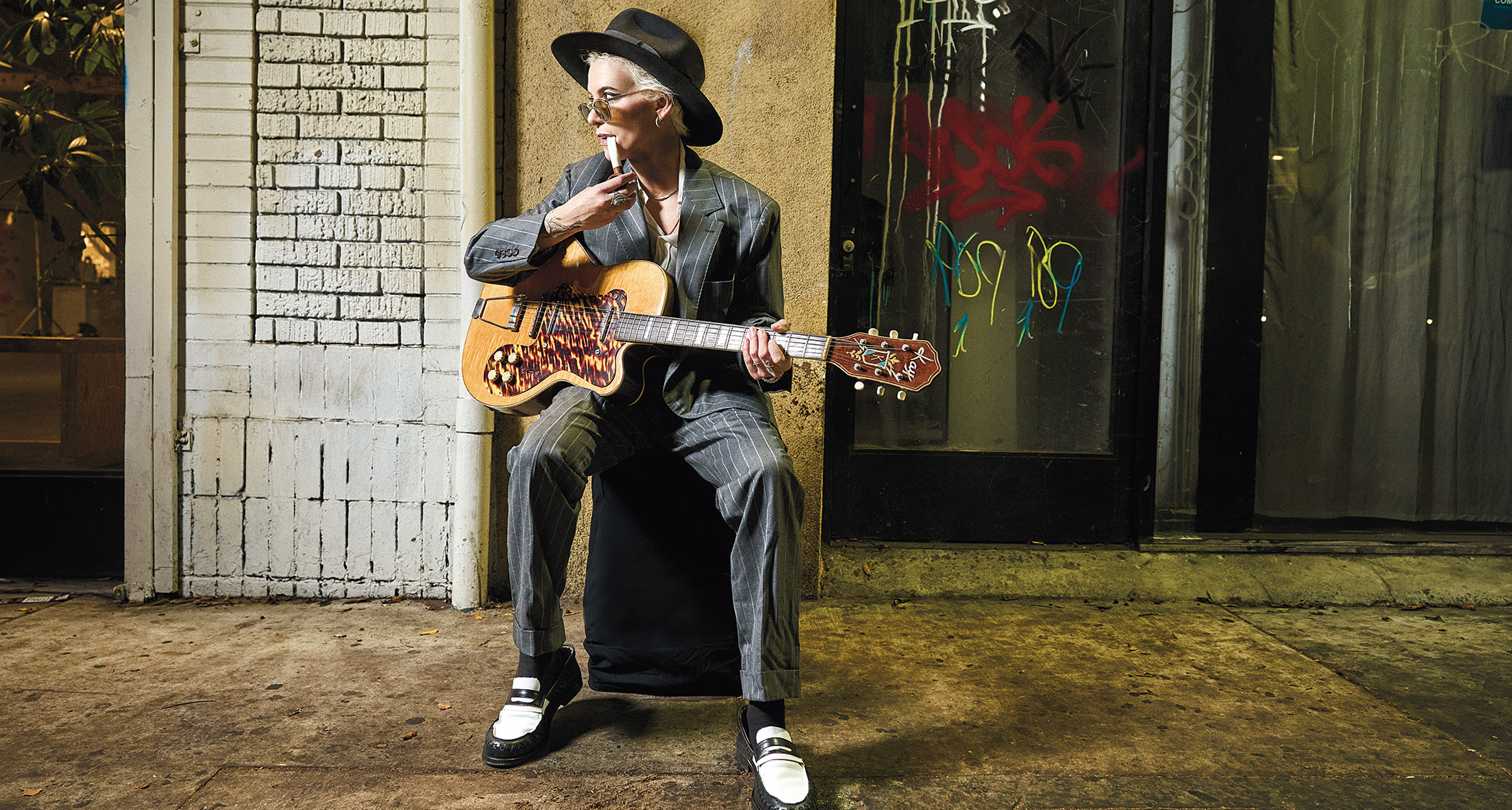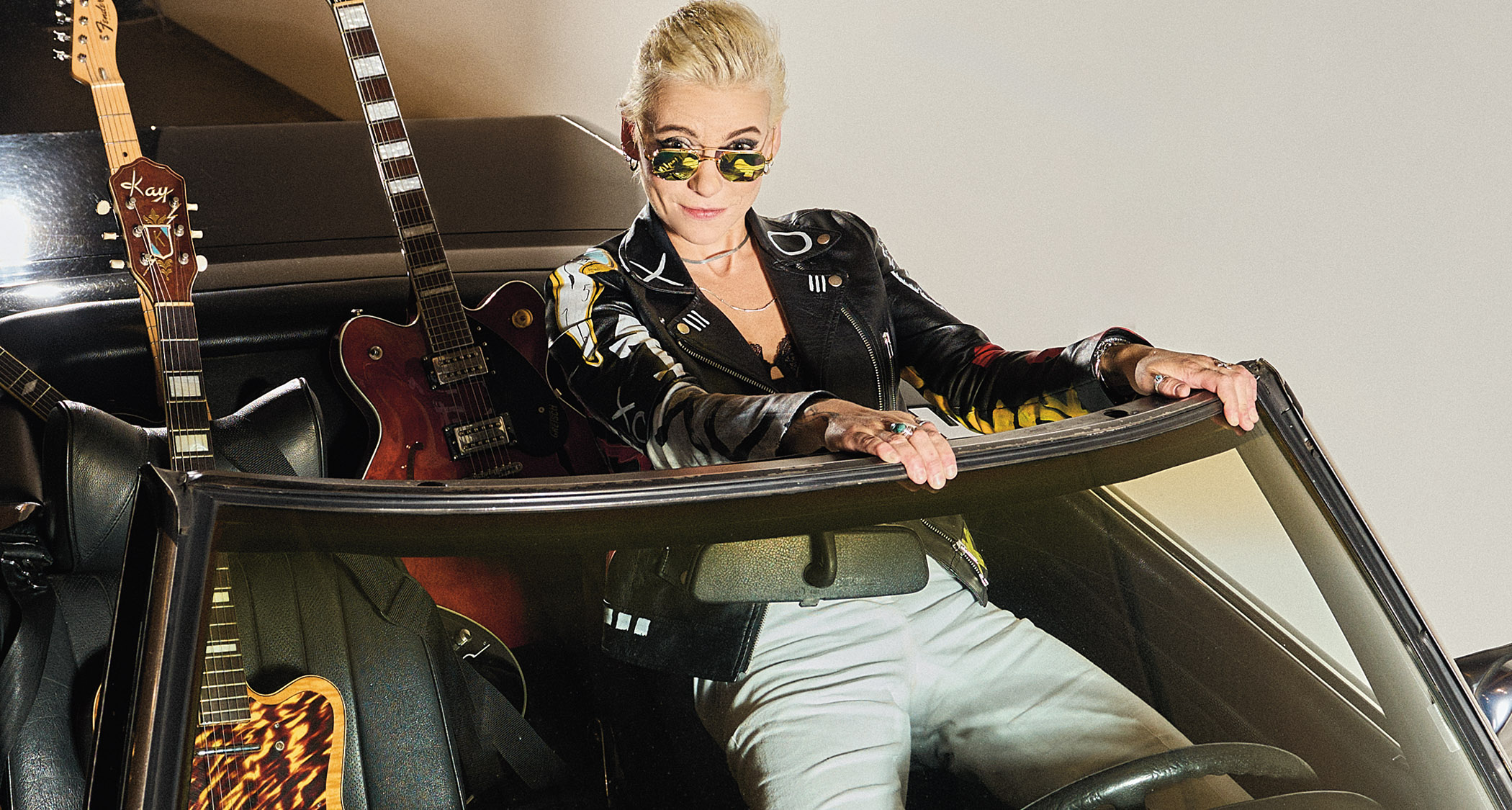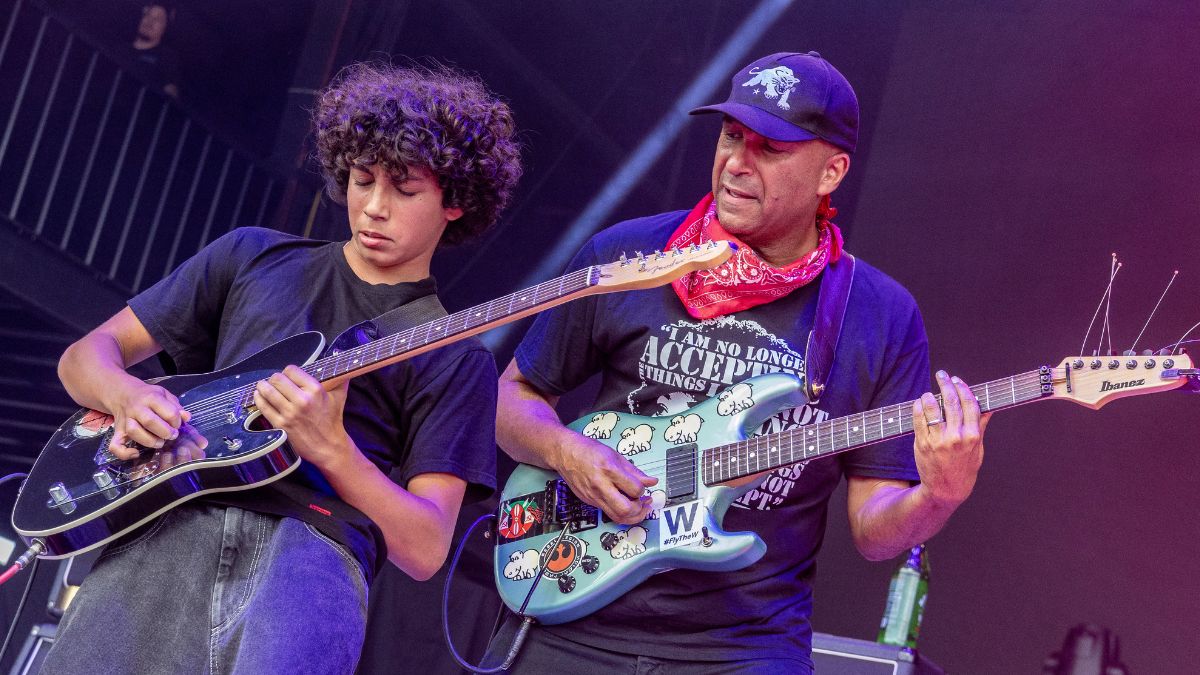“We went to Billy Corgan’s place in Chicago. He said, ‘When you think you’ve got a chorus, just write another one’”: Bones UK’s Carmen Vandenberg on going hard to make Soft – and the Jeff Beck pedal that won’t leave her ’board
Vandenberg is making guitar sounds you’ve never heard before. In a brilliant new album from Bones UK, she’s also blues, Hendrix and her mentor Jeff Beck – all in the pursuit of authenticity…

The fuzz pedal was the first guitar effect ever invented, so it’s kind of mind-bending that Bones UK’s second album Soft uses fuzz pedals to generate tones unlike anything we’ve ever heard.
These tones are the result of painstaking collaboration between guitarist Carmen Vandenberg and producer Filippo Cimatti, and they make Soft an incredibly fresh listen.
“We spend a lot of time trying to find sounds that I haven’t heard before,” reveals Carmen. “Sometimes it’ll take me five hours just to get the tone, and then it might be done in one or two takes. I love spending time on that. It’s a world to discover. I want people to think, ‘Is that or is that not a guitar?’”
Rock royalty have been touting Vandenberg as the UK’s next guitar great for almost a decade. After working briefly with Queen’s Roger Taylor, she met Jeff Beck at Taylor’s birthday party, and featured on his 2016 album Loud Hailer. Carmen’s session career has seen her working with Kate Nash and most recently with Morrissey.
The biggest hype, though, was around Bones UK, the duo comprised of Carmen and vocalist/rhythm guitarist Rosie Bones. Their single Pretty Waste was nominated for a Grammy. Their fusion of industrial and electronic sounds with Carmen’s blues-rooted playing made them look like the future of rock.

Their single Dirty Little Animals from the Arcane: League Of Legends soundtrack helped keep them in the spotlight, so that five years later Soft remains one of 2024’s most anticipated rock albums.
But Soft wasn’t the easiest album to finish. “We live in different places now, and it was during the pandemic. We would write and then grab whatever days we could be in the same place, or fly and meet somewhere. A little bit was done in Nashville; a little bit elsewhere. It was a long process,” Carmen admits.
All the latest guitar news, interviews, lessons, reviews, deals and more, direct to your inbox!
Billy Corgan said, ‘When you think you’ve got a chorus, just write another one. Try and top that with a better chorus...’
Two tracks, Won’t Settle and Fix Me, were produced by Queens Of The Stone Age bassist Michael Shuman, and two more, Us and Blood, were co-written with The Smashing Pumpkins’ Billy Corgan.
“We went to Billy’s place in Chicago and he gave us some suggestions. I always remember this one phrase. He said, ‘When you think you’ve got a chorus, just write another one. Try and top that with a better chorus. Then what you thought was the chorus will probably end up being a pre-chorus.’”

Carmen’s manifesto for the album is to make it sound real. “On the first record, we had the electronic thing, but we’ve done it. After we did it, a lot of other people were doing it. We got tired of listening to these over-polished records, not just in pop, but in rock ’n’ roll, where the human element’s gone. There’s no mistakes or quirks because everything’s just so gridded and perfect and tuned. We wanted to get away from that.”
There are still industrial and electronica influences, but the duo kept it sounding live, with the assistance of regular drummer Aaron ‘Heavy’ Matthews. “We recorded Me without a click in one take, just me and Heavy.”
She continues: “We all love Motown records. I’m a big Stax fan, too. All those records are incredible. We were discussing why we love those records, and we realised the verses are slower, and then they speed up in the choruses. We were like, ‘Let’s try and recreate the things that we love.’ So we recorded it without a click. Heavy actually started writing that song.”
Carmen then went to extremes to create a guitar tone that would fill the space with just one take. “I went through two amps, each one with its own pedalboard. Each ’board would have different octaves. Then I was going through a Leslie with a distortion on it, and a bass amp. It sounds like a bass, Leslie, and four guitars, but it’s just one. I’m still figuring out how I’m gonna do it live.”

Soft was recorded over three years in multiple studios, often with in-house gear, so the details of what pedals and amps were used are often lost.
“What I love is every time that you go to a studio there’s a bunch of shit that isn’t yours,” she says. “That makes it really fun because I don’t know what I’m about to hear.” Still, Carmen is happy to share what she can of her tone secrets. “I want to share! I think it was B.B. King who said, ‘We’re not thieves, we’re all borrowers’.
“Everybody’s taking something from somebody. Zeppelin wouldn’t have been Zeppelin if it wasn’t for the blues. So I want everyone to know about it, because once you’ve discovered something, you want to share it.”
One of the key tracks on the album, Me, was recorded at Nashville’s Sputnik studios, owned by The White Stripes’ producer Vance Powell.
“There’s every pedal that you can think of at that studio,” she says. “There’s one that looks like a beehive. I was experimenting. You should have seen it! It was like an ocean of pedals all around me. I know for sure there’s a Pigtronix Octava. If you put the fuzz of that with an EHX Micro Pog, the way that they phase out is beautiful. I also experiment with adding a wah to that all the time, because there’ll be certain tones that come out that you wouldn’t really expect.”
This combination produces one of the signature sounds of the album, an intense octave fuzz sound, but with a much clearer upper octave than a Hendrix Octavia tone. “You have an A/B system,” Carmen explains. “Put one pedal through one amp and the other one through the other amp. That can clean it up as well.”
Earthquaker Devices make another of Carmen’s favourite octave-up effects: “The Tentacle did so, so much on these records. I use a lot of Earthquaker Devices – Organizer, Data Corruptor… That stuff is incredible.” The Data Corruptor, a mono, three-octave guitar synth and fuzz, explains how some of the guitars sound so much like dirty analogue synths.
For the two-amp rig, Carmen admits: “There’d be my signature Blackstar CV30 and a Fender. I don’t remember if it was a DeVille or a Twin. A lot of the credit for the tones goes to Filippo. We put the two amps facing each other.
“I think both of them were mic’ed, but then there was a mic in the middle as well, just catching whatever was happening in between. The two amps were just shouting in each other’s face.”
Carmen’s limited edition CV30 boasts an unusual design with an American-style 6L6 valve output stage coupled with a more AC30-style chime. Live, she runs a pair of them. “I EQ them so they sound very different.”
On the track Fix Me, there is a similar tone, but some notes have dissonant overtones that sound almost like a ring modulator.
“I was playing the part, and it did something weird. It was one of those moments you go, ‘Nobody touch anything! Let’s record that before I lose this tone’. I wouldn’t be able to recreate that one. It was one of those moments where you’re just playing around with a bunch of shit.
“Suddenly, there’s a harmonic that’s jumping out. I have another song that I did, which is just one of my own songs, where it’s happened again,” says Carmen, referring to a solo album she is working on between other projects.

“The guitar does a weird overtone thing, jumping an octave. That happens a lot when you put these kinds of pedals together and you fuck with a wah. Then you’re like, ‘Oh, that note was amazing!’ I’m always saying to the producer ‘Did you get it?’, because it’s timing. Unless it’s perfectly the same as the previous take, you’re never gonna get it again. Your footwork has to be very precise on the wah.”
Sexism among guitarists is insecurity, isn't it? If you’re confident in yourself, you wouldn’t waste your time trying to bring other people down
While there were enough pedals on Soft to make Nova Twins blush, there are just three main guitars:
“The Tele is my baby, a 1963. She travels with me everywhere. It was really the tone that defined the first record, because it really cuts through. So I use that when I’m not gonna blend in to the music. If you put the octave on you have the sound that I created with Filippo, and you add the lower octaves so it gives you the substance a Tele normally wouldn’t have.
“She was used quite a bit on Soft,” Carmen continues. “But I did use a lot of my Dusenberg Julia, and some of the heavier riffs in the studio I do use Gibsons, quite often a Les Paul. It’s a 1984 that I bought from a friend in Italy when I was 16. So those would be the three main ones. I did use an SG as well. I love using as many tools as I can. I’ll try the riff or try the part with multiple guitars until I find the one that I like to play with a track.
“I try not to layer too much, because that will make it really difficult for me to do live,” Carmen says. “Typically when I pick a guitar for the track, it’ll stick to that one, unless I really want a different tone for something else.” Knee Deep, which features one of the album’s standout solos, was the Duesenberg, and Carmen cites Bikinis as an example of the Les Paul tone, and Fix Me was the Telecaster.
Jeff Beck gave me his gold [J Rockett] Archer, based on the Klon. And the octave, the Micro Pog. All of that can never leave
When we interviewed her, Carmen hadn’t yet configured her board for the next Bones UK tour. “I have a fair idea about that. There are some new Pigtronix ones, like the Star Eater. I use the Supro Drive, which is quite funny.
“But a few of my classics are always just going to stay on the board. Jeff Beck gave me his gold [J Rockett] Archer, based on the Klon. And the octave, the Micro Pog. All of that can never leave. I’m probably gonna do two different pedalboards this time. The tap-dancing becomes a bit tricky.”
The board she had with her for the interview was set up for her work with Morrissey, with whom she is recording an album. “With Morrissey, I’m using a CV30 and a Supro. I used a lot of Supro on the Bones UK record. A lot of Jeff’s tones were with the Supro as well on Loud Hailer.”
The Morrissey ’board has a lot in common with her most recent Bones UK setup. The Crybaby wah, J Rockett Archer, Pigtronix Octava, and MXR Super Badass Distortion are mainstays on Soft. The Fulltone OCD and Eric Gales signature EHX Raw Dawg drive give her other flavours of dirt.
Sandwiched between them is the Pigtronix Class A Micro Boost, which thanks to its positioning can either be used to push the Raw Dawg into more breakup or to boost the volume of the preceding pedals.
Next up is the ever-popular Line 6 DL4, which Carmen loves for its ability to save three different delays. For modulation, there’s the MXR Analogue Chorus, an MXR Uni-Vibe, and the Earthquaker Organizer, an organ simulator. The Mooer Shim Verb, Earthquaker Dispatch Maker, and Earthquaker Astral Destiny give her three reverb options.

Carmen uses the Shimverb in Spring mode. The Dispatch Marker is a combined delay/reverb; here, it’s set for a slapback ideal for Morrissey’s rockabilly material. The Astral Destiny is a pitch shifting reverb for more out-there sounds.
Soft ends with What If I Died?, a profound track featuring only Rosie’s voice and a single track of Carmen’s reverb-drenched guitar. The way Carmen weaves melodic licks around the chords recalls Hendrix, her first guitar inspiration.
“I like trying to add a melody instead of just playing chords,” she says. Amazingly, the cut on the album is the original demo they later realised they couldn’t top. “It was one live take, Rosie and I, without a click. We did it in the living room of the head of our label’s house in Lake Tahoe. It would have just been a small amp with a mic dangling in front of it.
“I can’t remember what the guitar was, but it sounds like a Strat. It was a late-night recording after a couple of martinis. The song is quite heavy, lyrically. If you do a bright-and-early take with a coffee, it’s not going to sound the same as a late-night recording when you’ve had a couple of drinks.”
The reverb-soaked clean tone on What If I Died? brings to mind Jeff Buckley, and it occasionally sounds as if some other effects are fading in and out of the mix. “That’s another trick that we did, because each time we wanted to do something we haven’t heard. Basically, the ambient stuff is the whole track reversed and flipped.”
For the climactic solo in Knee Deep, Carmen improvised one take. “Again,” she explains, “with this record, we were trying to catch authenticity. I remember that solo was recorded at Sonic Ranch in El Paso, and that’s the first take. We were just jamming through the song and Rosie was like, ‘We need an epic solo at the end’. I tried to do a few other ones, but we ended up keeping the first one.
“That’s a Gibson for sure, a Gibson and a big-ass Marshall. I don’t remember the pedal. It might be the MXR Super Badass. It was a vibe. There are times where I write a melody. For that song, I just went with it and followed the energy. It was very pentatonic-based.”
As Carmen notes, the solo uses classic blues phrasing, but set in a context of modern, electronica-influenced pop, and with her masterful playing, it sounds fresh.
“On a track like that, and chord changes like that, I can’t help the blues coming out,” she smiles. “I love the blues. It’s in my playing, so if someone says to go do a solo, it’s going to sound bluesy at some point. It’s part of who I am, and so it’s always going to be on all of our records. The first album had Girls Can’t Play Guitar, which is just a Muddy Waters riff and then I changed the tone and made it modern.”
A similar thing happens in Fix Me, when a rock ’n’ roll riff that would be a cliché anywhere else takes the listener completely by surprise. “It’s like, ‘We like that stuff. We listen to it. So why can’t we do our version of it?’” Carmen shrugs.
Girls Can’t Play Guitar was inspired by a real incident at an early Bones UK gig. “It was really funny. The words were exactly, ‘Your band will never be as good as our band because girls can’t play guitar as well as boys.’ It was just like, ‘Sure, sure,’” she laughs, then says the way that such nonsense often comes from the worst players.
“It’s insecurity, isn’t it?” she muses. “Only people that are actually insecure or feel threatened in any way would say that. If you’re confident in yourself, you wouldn’t waste your time trying to bring other people down.”
Carmen identifies Dopamine as another standout on the new album. “It has a Middle Eastern kind of feel to it,” she says. “I was learning all those scales, so I put them into this. For the ending of the song, because dopamine can become really addictive, we wanted to showcase that feeling of discomfort. It really makes you quite anxious at the end.
“That was inspired by The Beatles’ A Day In The Life, where the whole orchestra keeps ascending in semitones, but they’re never at the same time. That’s how we created that discomfort. It’s just a bunch of instruments creeping up, but all in different places.”
Carmen Vandenberg’s ability to turn her creativity in almost any direction makes her the complete modern guitarist. In Bones UK, she combines Hendrix and Jeff Beck-worthy blues sensibility with cutting-edge tones and production.
There is also that solo album in progress: “Coming out in a few years, or whenever I’m ready.” And while working with Morrissey, she’s filling the giant shoes of not only Johnny Marr – while maintaining the same philosophy that propels Soft.
As she says of her performance on a new Morrissey song: “There’s a solo with this bum note. I played it over and over to make people believe that I did it on purpose. But I didn’t go and change it. I don’t want to change mistakes anymore. That humanity – I miss it on records.
“So I want to keep it in there. I’m learning a lot, doing a record with Morrissey and Joe Chiccarelli, who’s an incredible producer. Again, just plenty of time to learn a bunch of things that I didn’t know before. Even just the way he writes in his melodies.”
She pauses and smiles: “I guess I’m a listener. And when I’m listening, anybody I encounter can inspire me.”
- Soft is out now via Sumerian.
Jenna writes for Total Guitar and Guitar World, and is the former classic rock columnist for Guitar Techniques. She studied with Guthrie Govan at BIMM, and has taught guitar for 15 years. She's toured in 10 countries and played on a Top 10 album (in Sweden).












